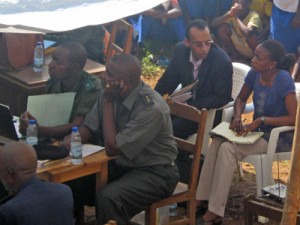By Tara Pistorese
Impunity Watch Reporter, Africa
KINSHASA, Democratic Republic of the Congo—Since 1996, approximately 500,000 people in the Democratic Republic of the Congo (DRC) have fallen victim to sexual violence according to United Nations (UN) estimates. Although UN members and the Security Council have condemned the sexually motivated injustice, the sufferers of these violent crimes are often stigmatized by their own communities and rarely see their attackers brought to justice.

“As violence escalates in the eastern [DRC], I am deeply concerned that sexual violence is once again a pattern of the conflict,” said the acting Special Representative of the Secretary-General on Sexual Violence in Conflict, Vijay Nambiar, in a statement. “In the context of illegal activities of armed groups, serious crimes have been reported.”
A lack of funding and issues of integrity have contributed to the overall failure to bring many perpetrators of these crimes to justice in DRC. Moreover, many victims are unable to reach a police station or afford the costs of bringing a case to trial.
Specifically, in South Kivu in 2005, fewer than 142 of incidents of sexual violence faced a tribunal, although 14,200 were recorded that year. Similar failures have surfaced within DRC’s national courts, although the Ituri district boasts some progress, including ten recent rape convictions.
In an effort to curb judicial shortcomings, a project was initiated in South Kivu in 2009 whereby mobile courts travel from city to city to bring justice to the victims of sexual violence. The mobile gender courts—supported by the Open Society Justice Initiative, the American Bar Association Rule of Law Initiative, and the Open Society Institute for Southern Africa in collaboration with the Congolese government—have emphasized locally-led justice.
The project has enjoyed considerable success. Within the first twenty months of its existence, fourteen court sessions took place, 248 cases were tried, and 140 perpetrators were convicted of rape. Mobile courts have held sessions in many cities and villages from urban regions, such Baraka and Bakavu, to more remote villages, like Kamituga and Mwenga.
However, limitations on the mobile courts call their sustainability and effectiveness into question. The itinerant agencies often require staff to travel by plane and automobile very far distances and through difficult terrain to reach remote service areas. Sadly, the courts also lack funding for basic and necessary equipment and supplies, such as paper.
Mobile trials typically last two weeks, in compliance with international law requiring crimes of this nature to conclude within three months. Additionally, this timeline provides “timely redress to individual victims in communities still struggling with the chaotic aftermath of war and political upheaval,” according to Judge Mary McGowan Davis, who was recently invited to assess the productivity of the mobile courts. On the other hand, the speed of the trials and their conclusions make important components of an effective trial, such as obtaining witnesses, very difficult.
The court sessions, which are exclusively staffed by Congolese citizens, are typically made open to the public in an effort to break down the stigma surrounding victims of sexual crimes.
For further information, please see:
All Africa—Africa: Mobile Gender Courts-Delivering Justice in the DRC—30 July 2012
UN News Centre—UN Official Condemns Sexual Violence by Renegade Soldiers—18 July 2012
News 24—UN Condemns Eastern DRC Attacks—17 July 2012
Open Society Initiative for Southern Africa—Helping to Fight Impunity for Sexual Crimes in DRC—7 May 2012